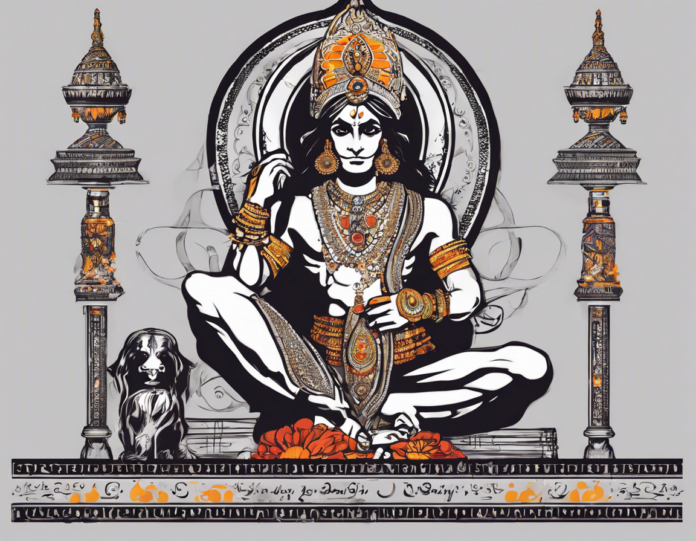Introduction
Shani Jayanti, also known as Shani Amavasya, is an auspicious Hindu festival that celebrates the birth of Lord Shani, the God of Justice and Karma. Observing this day is believed to bring blessings, prosperity, and protection from malefic effects. This day falls on the Amavasya or no moon day in the Jyeshtha month of the Hindu calendar, typically in May or June. It is an important occasion for devotees of Lord Shani to offer prayers, perform rituals, and seek his divine grace. In this article, we will delve into the significance of Shani Jayanti, the story and attributes of Lord Shani, the rituals and customs associated with this festival, as well as its spiritual and astrological importance.
Significance of Shani Jayanti
Shani Jayanti holds great significance for those who believe in Hindu astrology and the influence of celestial bodies on human life. Lord Shani is considered a strict judge who rewards or punishes individuals based on their actions and karma. It is believed that worshiping Lord Shani on his birthday can mitigate the negative effects of Saturn in one’s astrological chart and bring about positive changes in life. Devotees observe fasts, offer prayers, and perform special rituals to seek his blessings for prosperity, longevity, and protection from obstacles and hardships.
Story and Attributes of Lord Shani
Lord Shani, also known as Shani Dev, is one of the Navagrahas or nine celestial deities in Hindu astrology. He is the son of Surya Dev (Sun God) and Chhaya Devi, and is often depicted as a dark-complexioned deity riding a chariot pulled by crows or vultures. Lord Shani is associated with discipline, justice, hard work, and the consequences of one’s actions. He is believed to be a strict disciplinarian who punishes those who indulge in unethical or immoral behavior, but also rewards those who lead a righteous life.
According to mythology, Lord Shani once offended his father, Surya Dev, by casting his gaze upon him, which caused Surya Dev’s chariot to malfunction. As a result, Surya Dev cursed Lord Shani to suffer from leprosy. However, Lord Shani accepted his fate and embraced his role as the dispenser of justice and karma. Devotees believe that by propitiating Lord Shani with sincerity and devotion, they can mitigate the effects of his harsh gaze and seek his benevolence.
Rituals and Customs
On Shani Jayanti, devotees wake up early, take a holy bath, and visit Lord Shani temples to offer prayers and seek his blessings. They often light sesame oil lamps, offer black sesame seeds, black cloth, and blue flowers to Lord Shani, and recite prayers and mantras dedicated to him. Some devotees observe a fast or eat simple vegetarian meals to purify their bodies and minds. It is believed that by observing these rituals with faith and devotion, one can appease Lord Shani and gain his favor.
Another common custom followed on Shani Jayanti is to donate to the poor and needy, especially items like black sesame seeds, mustard oil, black clothes, iron utensils, and other items associated with Lord Shani. This act of charity is believed to propitiate Lord Shani and alleviate the sufferings caused by Saturn’s influence. Some devotees also perform special homas or yagnas to seek protection from malefic influences and attract positive energies into their lives.
Spiritual and Astrological Importance
From a spiritual perspective, Shani Jayanti is an opportunity for introspection, self-discipline, and atonement for past misdeeds. It is a time to reflect on one’s actions, seek forgiveness for any wrongdoings, and resolve to lead a righteous and virtuous life. By acknowledging the karmic principles represented by Lord Shani, devotees can cultivate patience, resilience, and humility in the face of life’s challenges.
From an astrological standpoint, Saturn is considered a powerful planet that influences various aspects of human life, including career, relationships, health, and longevity. A favorable Saturn in one’s horoscope can bestow prosperity, success, and spiritual growth, while an afflicted Saturn can lead to delays, obstacles, and setbacks. By honoring Lord Shani on his birthday, individuals seek to appease Saturn and harmonize its energies to achieve balance and fulfillment in their lives.
FAQs (Frequently Asked Questions)
1. What is the best time to observe Shani Jayanti?
– Shani Jayanti falls on the Amavasya or no moon day in the Jyeshtha month of the Hindu calendar, typically in May or June. Devotees usually observe this day with prayers and rituals during the early morning hours.
2. How can I propitiate Lord Shani on Shani Jayanti?
– You can propitiate Lord Shani by offering prayers, lighting sesame oil lamps, reciting mantras, donating to the poor, and observing a fast or eating simple vegetarian meals. Seeking forgiveness for past mistakes and resolving to lead a righteous life are also important aspects of worship.
3. What are the benefits of worshiping Lord Shani on Shani Jayanti?
– Worshiping Lord Shani on Shani Jayanti is believed to mitigate the negative effects of Saturn in one’s astrological chart, bring blessings of prosperity and longevity, and protect from obstacles and hardships. It can also help cultivate virtues like patience, resilience, and humility.
4. Can anyone observe Shani Jayanti, regardless of their astrological beliefs?
– Yes, Shani Jayanti is a festival that can be observed by anyone seeking the blessings and protection of Lord Shani, irrespective of their astrological beliefs. It is a time to seek inner purification, spiritual growth, and atonement for past actions.
5. Are there any specific mantras or prayers dedicated to Lord Shani for Shani Jayanti?
– Yes, there are specific mantras and prayers dedicated to Lord Shani, such as the Shani Mantra (“Om Shanaischaraya Namah”) and the Shani Gayatri Mantra. Reciting these mantras with devotion and sincerity can invoke the blessings of Lord Shani.
6. Can non-Hindus participate in the celebrations of Shani Jayanti?
– Yes, non-Hindus who respect and appreciate the spiritual significance of Shani Jayanti are welcome to participate in the celebrations and rituals. The festival is a time for seeking divine grace, practicing charity, and fostering spiritual values that are universal in nature.
7. How does observing a fast on Shani Jayanti benefit devotees?
– Observing a fast on Shani Jayanti is believed to purify the body and mind, enhance spiritual consciousness, and invoke the blessings of Lord Shani. Fasting is a symbolic way of demonstrating self-discipline, restraint, and devotion to seek the divine favor.
8. What are some common offerings made to Lord Shani on Shani Jayanti?
– Common offerings made to Lord Shani on Shani Jayanti include black sesame seeds, sesame oil, black cloth, blue flowers, mustard oil, iron utensils, and other items associated with Saturn. These offerings are believed to appease Lord Shani and attract his blessings.
9. Can I seek the blessings of Lord Shani for specific purposes, such as career growth or health improvement?
– Yes, devotees can seek the blessings of Lord Shani for specific purposes, such as career growth, health improvement, relationship harmony, and overall well-being. By offering prayers, performing rituals, and practicing charity with sincere intentions, one can receive the desired blessings of Lord Shani.
10. How can I incorporate the teachings of Lord Shani into my daily life beyond Shani Jayanti?
– Beyond Shani Jayanti, you can incorporate the teachings of Lord Shani by practicing honesty, integrity, hard work, discipline, and compassion in your daily life. By embracing the karmic principles represented by Lord Shani, you can cultivate resilience, responsibility, and wisdom to navigate life’s challenges with grace and dignity.










